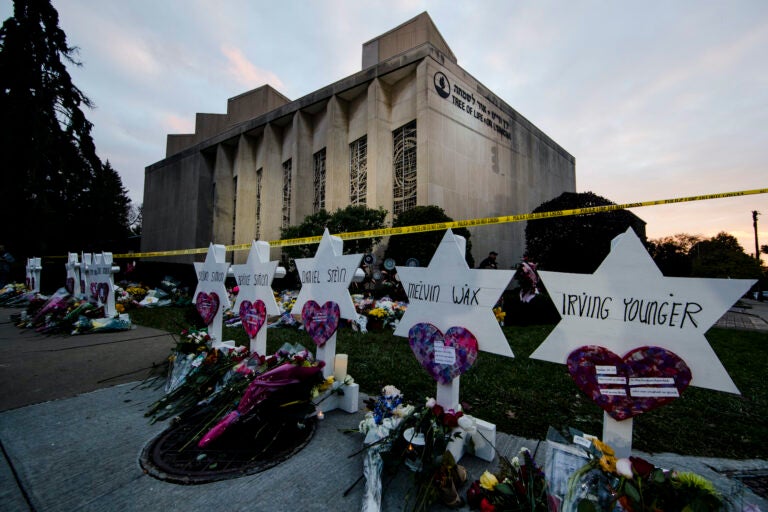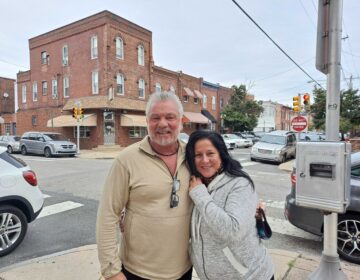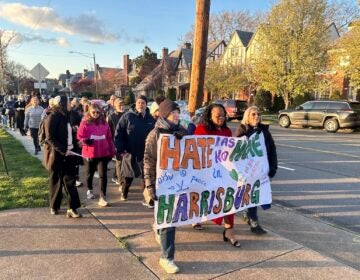Pittsburgh writers look back on Tree of Life shooting in new book
“Bound in the Bond of Life: Pittsburgh Writers Reflect on the Tree of Life Tragedy” (University of Pittsburgh Press) features essays by two dozen writers.

In this Oct. 29, 2018 file photo, a makeshift memorial stands outside the Tree of Life Synagogue in the aftermath of a deadly shooting at the in Pittsburgh. (AP Photo/Matt Rourke)
The 2018 shooting at Pittsburgh’s Tree of Life synagogue was the deadliest anti-Semitic attack in U.S. history. As such, it’s readily contextualized alongside the spikes in nativist rhetoric and white-nationalist violence that have plagued the country in recent years.
Yet in many ways, the impact of the attack that claimed 11 lives two years ago this week was also extraordinarily local. It happened in Squirrel Hill, a neighborhood most Pittsburghers know well, and many area residents have only a degree or two of separation from that day’s violence.
A new book reckons with that legacy. “Bound in the Bond of Life: Pittsburgh Writers Reflect on the Tree of Life Tragedy” (University of Pittsburgh Press) features essays by two dozen writers.
The book’s title quotes a Jewish blessing from the Book of Samuel that is part of the Jewish mourning liturgy. But Beth Kissileff, the author and educator who co-edited the volume with Eric Lidji, of Heinz History Center, said a goal was to offer a diversity of voices.
“There are both Jewish and non-Jewish contributors because the event, while it affected the Jewish community and the bereaved are Jewish families, the event affected the larger Pittsburgh community as well,” she said in an interview this past week. “I hope that the essays in this book will show people that there are a range of emotions around the event, and it’s really important to acknowledge and work with your emotions, whatever they are.”
Kissileff is the spouse of Rabbi Jonathan Perlman, of New Light Congregation, one of three congregations housed in the Squirrel Hill synagogue that day. Perlman, who survived the attack by hiding himself and others in the building, contributes an essay. So do other members of the synagogue’s broader community, including Tree of Life board member and Carnegie Mellon University history professor Laura Zittrain Eisenberg, and writer Molly Pascal, a Tree of Life congregant.
Toby Tabachnik, editor of The Jewish Chronicle, wrote a piece titled, “The Last Day I Felt Safe As an American Jew.”
Other contributors include Andrew Goldstein and Peter Smith, two reporters on the Pittsburgh Post-Gazette team that won the Pulitzer Prize for covering the shooting; David Shribman, who led that coverage as the newspaper’s then-executive editor; and P-G columnist Tony Norman. Smith’s essay, “Covering the Unprecedented,” places his experience reporting on the massacre within the context of his career as a religion journalist, and of how other faith communities here responded to the shooting.
“If the news is about what happened, the personal essay is about the emotions and feelings behind what happened,” Kissileff said.
Kissileff’s own essay, “Honey from the Carcass,” explores how she attempted to process the massacre through the act of writing. Her piece’s title references a story from the Old Testament Book of Judges, about Samson distributing honey from a beehive he found inside the skeleton of a lion he had once killed.
“The atrocity is still there, but we need to find a way to still have sweetness in our lives,” she said.
Co-editor Lidji, director of the History Center’s Rauh Jewish History Program & Archives, oversees preservation of documentation of the 2018 attack. It’s an experience he explores in his essay titled “Processing.”
Kissileff said she and Lidji asked other survivors of the attack to contribute to the book, but they declined. She said the book is valuable because it illustrates the ways people are coping after some time has passed.
“We have a little bit of a chance to reflect without the pain and grief being so raw,” said Kissileff. “That’s what this volume does.”

Get daily updates from WHYY News!
WHYY is your source for fact-based, in-depth journalism and information. As a nonprofit organization, we rely on financial support from readers like you. Please give today.





